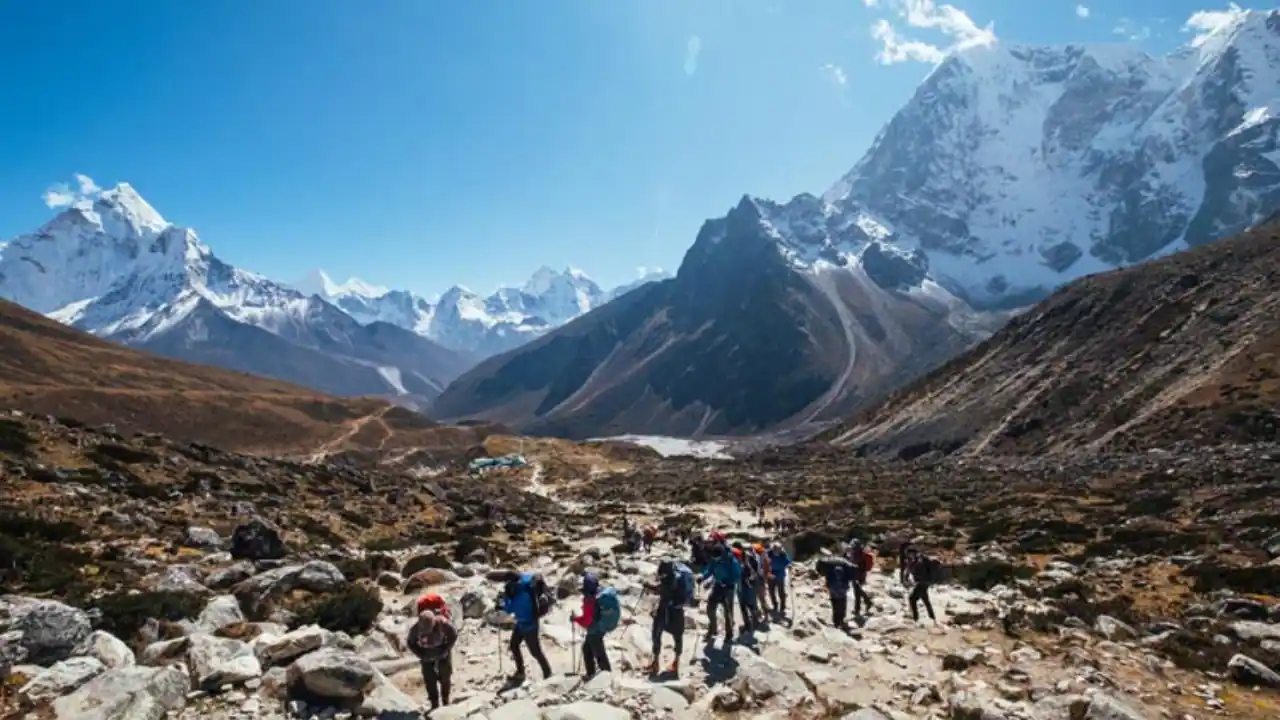How to Choose the Right Everest Base Camp Trekking Company
Choosing the right trekking company for your Everest Base Camp adventure is crucial for ensuring a safe, enjoyable, and memorable experience. With numerous trekking agencies operating in Nepal, selecting the most suitable one requires careful consideration of several factors.
First and foremost, it is essential to evaluate the company’s reputation and experience. Look for trekking companies with a proven track record in organizing Everest Base Camp treks. Research online reviews and testimonials from previous trekkers to gauge the company’s reliability and service quality. Companies with extensive experience in high-altitude treks are more likely to have well-developed safety protocols and knowledgeable staff, which is crucial for managing the unique challenges of the Everest region.
Safety should be a top priority when choosing a trekking company. Ensure that the company prioritizes safety by providing well-trained guides and porters who are familiar with altitude sickness and emergency procedures. Verify that the company’s equipment and vehicles are well-maintained and that they adhere to local safety regulations. A reputable company should be able to provide clear information about their safety measures, including first-aid training for guides and comprehensive insurance coverage.
Mount Everest Base Camp Another important consideration is the level of service and support provided by the trekking company. Evaluate the inclusions and exclusions in the trekking package. A good company should offer a comprehensive package that includes necessary permits, accommodations, meals, and transportation, ensuring that there are no hidden costs. Additionally, the company should offer personalized services, such as customized itineraries and flexible scheduling, to cater to the specific needs of your group.
Communication and responsiveness are also key factors. Choose a company that is prompt and clear in their communication. This includes providing detailed information about the trek, answering queries efficiently, and being responsive to any concerns or changes you may have. Good communication before the trek is a sign of a professional and organized company that values customer service.
Consider the company’s environmental and ethical practices. Responsible trekking companies prioritize sustainable tourism practices and work to minimize their environmental impact. They should support local communities and ensure fair treatment of their staff. Inquire about the company’s efforts to promote environmental conservation and their policies on responsible trekking.
Finally, compare costs and value for money. While it is important to stay within budget, the cheapest option is not always the best. Weigh the cost against the quality of service, safety standards, and inclusions offered. A slightly higher price might be justified by superior services, better safety measures, and a more enriching trekking experience.
By carefully evaluating these aspects, you can choose a trekking company that will provide a safe, enjoyable, and well-organized Everest Base Camp trek, ensuring that your adventure in the Himalayas is both memorable and fulfilling.
Introduction: The Importance of Choosing the Right Company
Choosing the right trekking company for your Everest Base Camp adventure is crucial for ensuring a successful and memorable experience. The trek to Everest Base Camp is a significant undertaking that involves navigating challenging terrain, dealing with high altitudes, and managing various logistical aspects. A reputable trekking company plays a vital role in providing the necessary support, safety, and guidance throughout the journey. The right company can enhance your trekking experience by offering well-organized itineraries, experienced guides, and reliable logistics, while also addressing any concerns or issues that may arise. Conversely, selecting an inexperienced or unqualified company can lead to safety risks, poor service, and unforeseen difficulties. Therefore, thorough research and careful selection of a trekking company are essential for a smooth and enjoyable trek. By prioritizing the right company, you can focus on the adventure and the stunning landscapes of the Himalayas, confident that you are in capable hands.
Researching Trekking Companies: Where to Start
Researching trekking companies for your Everest Base Camp trekking begins with gathering information from reliable sources. Start by looking online for trekking agencies that specialize in Everest Base Camp treks. Websites, travel forums, and social media platforms can provide insights into different companies and their offerings. Reading reviews and testimonials from previous trekkers can give you a sense of the company’s reputation and service quality. Travel blogs and guidebooks often feature recommendations and personal experiences that can be useful. Additionally, contacting local tourism offices or travel agents in Nepal can provide further guidance and suggestions. It’s also beneficial to ask for recommendations from friends or fellow trekkers who have completed similar treks. Collecting a list of potential companies and comparing their services, packages, and customer feedback will help you make an informed decision. Thorough research ensures that you choose a company that meets your needs and expectations for a safe and enjoyable trek.
Evaluating Company Experience and Reputation
Evaluating a trekking company’s experience and reputation is essential for ensuring a reliable and successful Everest Base Camp trek. Look for companies with a long history and extensive experience in organizing high-altitude treks. Established companies are more likely to have the expertise needed to handle the complexities of the Everest region, including altitude sickness management and emergency response. Check the company’s track record by reading reviews and testimonials from previous trekkers. Positive feedback and high ratings are indicators of a company’s credibility and service quality. It’s also beneficial to verify if the company has successfully managed treks in the past, particularly those involving groups similar to yours. Additionally, consider any awards or recognitions the company may have received within the trekking or travel industry. A reputable company with substantial experience is more likely to offer well-organized treks, knowledgeable guides, and reliable support, contributing to a safer and more enjoyable adventure.
Checking Licenses and Certifications
Checking licenses and certifications is a crucial step in selecting a trekking company for Everest Base Camp. Ensure that the company is properly licensed by relevant local authorities, such as the Nepal Tourism Board or the Department of Tourism. A valid license confirms that the company operates legally and adheres to local regulations. Additionally, verify if the company holds certifications from recognized trekking organizations or associations, which indicate adherence to industry standards and best practices. Certifications such as those from the Trekking Agencies’ Association of Nepal (TAAN) or the Nepal Mountaineering Association (NMA) can be indicators of a company’s commitment to quality and safety. Certifications ensure that the company meets specific criteria for operational standards, guide training, and safety protocols. Request to see these licenses and certifications directly or check their validity through official channels. By confirming these credentials, you can be more confident in the company’s legitimacy and professionalism, contributing to a safer and more organized trekking experience.
Assessing Safety Standards and Procedures
Assessing safety standards and procedures is vital when choosing a trekking company for Everest Base Camp. Safety should be a top priority due to the high-altitude nature of the trek and the potential risks involved. Start by inquiring about the company’s safety protocols and emergency procedures. Ensure that the company provides well-trained guides who are experienced in high-altitude trekking and first aid. Ask about their policies for managing altitude sickness and emergency evacuations. A reputable company should have clear procedures for handling medical emergencies and be equipped with the necessary safety gear and communication tools. Additionally, verify that the company’s equipment, such as trekking gear and vehicles, is well-maintained and up to safety standards. Review the company’s insurance policies to ensure that they offer comprehensive coverage for trekkers. By thoroughly assessing these safety measures, you can ensure that the company prioritizes your well-being and is prepared to handle any challenges that may arise during the trek.
Reviewing Trekking Packages and Itineraries
Reviewing trekking packages and itineraries is a crucial step in selecting the right company for your Everest Base Camp trek. Start by examining the details of the trekking packages offered by different companies. Look for itineraries that suit your preferences and fitness levels, ensuring they include adequate acclimatization days to handle the high altitude. A well-structured itinerary should balance trekking with rest, allowing for gradual acclimatization and reducing the risk of altitude sickness. Compare the duration of treks, daily walking distances, and overall pace to find a package that matches your needs. Additionally, check what each package includes, such as meals, accommodations, and local transportation. Ensure that the itinerary offers sufficient flexibility for any unforeseen changes or needs during the trek. By carefully reviewing these aspects, you can choose a package that provides a safe and enjoyable experience while aligning with your expectations and trekking goals.
Comparing Costs and Inclusions
Comparing costs and inclusions is essential when selecting a trekking company for Everest Base Camp. Trekking costs can vary widely based on the services provided, so it’s important to understand what is included in the price. Examine the details of each company’s package to see what is covered, such as permits, accommodations, meals, guide fees, and transportation. Ensure that there are no hidden costs and that all necessary expenses are included. Compare the total cost of each package with the services provided to determine the best value for your money. While it’s tempting to choose the cheapest option, remember that the quality of service, safety standards, and inclusions are equally important. A slightly higher cost may offer additional benefits such as better accommodations or more experienced guides, which can enhance your overall trekking experience. By thoroughly comparing costs and inclusions, you can make an informed decision that ensures you receive good value while meeting your trekking needs.
Reading Customer Reviews and Testimonials
Reading customer reviews and testimonials is an invaluable step in selecting a trekking company for Everest Base Camp. Reviews provide firsthand insights into the experiences of previous trekkers, highlighting both positive and negative aspects of the company’s services. Start by looking for reviews on the company’s website, travel forums, and review platforms such as TripAdvisor. Pay attention to recurring themes in the feedback, such as the quality of guides, the safety measures in place, and the overall organization of the trek. Positive reviews can indicate a reliable company with satisfied customers, while negative reviews may reveal potential issues or concerns. It’s also beneficial to look for detailed testimonials that provide specific examples of the trek experience. Engaging with previous trekkers through forums or social media can offer additional perspectives and recommendations. By carefully reading and analyzing customer reviews, you can gain a clearer understanding of what to expect and make a more informed choice.
Understanding the Guide-to-Trekker Ratio
Understanding the guide-to-trekker ratio is crucial for ensuring a well-supported and safe trekking experience. The guide-to-trekker ratio refers to the number of guides or support staff assigned per trekker in a group. A lower ratio typically means more personalized attention, better safety management, and a more enjoyable trekking experience. Ideally, each group should have at least one experienced guide for every group of trekkers, with additional support staff such as assistant guides or porters depending on the group size. This setup ensures that each trekker receives adequate support, especially in managing altitude sickness, navigating the terrain, and handling emergencies. When evaluating trekking companies, inquire about their guide-to-trekker ratio and compare it with industry standards. A higher guide-to-trekker ratio indicates a commitment to providing quality support and enhancing the overall safety and experience of the trek. By understanding this ratio, you can select a company that offers the appropriate level of support for a safe and successful Everest Base Camp trek.
Examining the Quality of Equipment and Gear Provided
Examining the quality of equipment and gear provided by a trekking company is essential for ensuring a safe and comfortable Everest Base Camp trek Map . The trek involves challenging conditions and high altitudes, making it crucial to have reliable and well-maintained equipment. Start by inquiring about the type and condition of gear included in the package, such as trekking poles, sleeping bags, and tents. High-quality gear should be durable, suitable for high-altitude conditions, and regularly checked for safety and performance. Some companies provide personal gear like insulated jackets and boots, so ensure these items meet the necessary standards for comfort and protection. Additionally, verify if the company offers options for renting or purchasing gear if needed. A reputable company will have a track record of using quality equipment and will be transparent about what is provided. By thoroughly examining the quality of equipment and gear, you can ensure that you are well-prepared for the trek, enhancing both safety and overall enjoyment.
Assessing the Company’s Emergency Response Plan
Assessing a trekking company’s emergency response plan is crucial for ensuring safety during the Everest Base Camp trek. Given the challenging and remote nature of the trek, having a robust emergency response plan in place is essential. Inquire about the company’s procedures for handling medical emergencies, including how they manage altitude sickness, injuries, or other health issues. Ensure that their guides are trained in first aid and have experience with high-altitude medical conditions. Ask about their evacuation procedures and whether they have access to emergency services such as helicopters or ground transportation. Additionally, verify if the company has a contingency plan for adverse weather conditions or other unexpected events. A well-prepared company should be able to provide detailed information on their emergency protocols and show evidence of past successful emergency responses. By thoroughly evaluating the company’s emergency response plan, you can ensure that you are well-protected and can respond effectively to any potential issues during your trek.
Evaluating Support Services: Porters, Meals, and Accommodation
Evaluating support services such as porters, meals, and accommodation is an important aspect of selecting a trekking company for Everest Base Camp elevation. Porters play a critical role in carrying gear and supplies, so it’s essential to ensure that they are well-trained, adequately equipped, and treated fairly. Verify that the company provides sufficient support staff to manage the group’s needs and that the porters are provided with appropriate gear and fair wages. Meals along the trek should be nutritious, varied, and suitable for the high-altitude environment. Inquire about the types of meals provided and any dietary accommodations the company can offer. Accommodation quality is also a key consideration; ensure that the teahouses or lodges included in the trek are clean, safe, and comfortable. Check whether the company provides detailed information about the accommodation options and if they are prepared for varying levels of comfort and hygiene. By evaluating these support services, you can ensure that your trek will be well-supported and enjoyable.
Checking for Environmental and Ethical Practices
Checking for environmental and ethical practices is essential when selecting a trekking company for Everest Base Camp. Sustainable tourism and ethical treatment of local communities are critical considerations for a responsible trek. Inquire about the company’s environmental policies, such as waste management, recycling efforts, and initiatives to minimize their ecological footprint. A responsible company should actively work to preserve the natural beauty of the Himalayas and minimize their impact on the environment. Additionally, assess the company’s ethical practices concerning local communities, including fair treatment and fair wages for staff, especially porters. Ask about their involvement in community support and development projects. Companies that adhere to ethical practices and environmental stewardship contribute positively to the regions they operate in and ensure that their trekking activities are sustainable. By selecting a company with strong environmental and ethical standards, you support responsible tourism and help protect the integrity of the Everest region.
Understanding Payment Terms and Cancellation Policies
Understanding payment terms and cancellation policies is crucial when choosing a trekking company for Everest Base Camp. Payment terms typically include the deposit amount required to secure your booking and the deadlines for final payments. Ensure that you are aware of the payment schedule and any additional fees associated with payment methods. Cancellation policies are equally important, as they outline the conditions under which you can cancel your trek and any refunds you may be entitled to. Review the company’s policy on cancellations, including any penalties or charges for cancellations made within specific time frames. Additionally, check if the company offers travel insurance options or recommendations, as this can provide added protection in case of unforeseen circumstances. By clearly understanding these terms, you can avoid potential financial losses and ensure that you are comfortable with the company’s policies before committing to the trek.
Making the Final Decision: Questions to Ask Before Booking
Making the final decision on a trekking company for Everest Base Camp involves asking key questions to ensure that all aspects of the trek meet your expectations. Start by asking about the company’s experience and track record with Everest Base Camp treks, including their safety record and how they handle emergencies. Inquire about the qualifications and experience of their guides, as well as the guide-to-trekker ratio to ensure personalized attention. Confirm the inclusions and exclusions in the trek package, such as permits, accommodations, meals, and transportation. Ask about the quality of the equipment provided and any additional gear you may need to bring. Clarify payment terms, cancellation policies, and any available insurance options. Additionally, seek information about their environmental and ethical practices to ensure they align with your values. By asking these questions, you can gain a comprehensive understanding of what to expect and make an informed decision that ensures a safe, enjoyable, and well-organized trekking experience.







